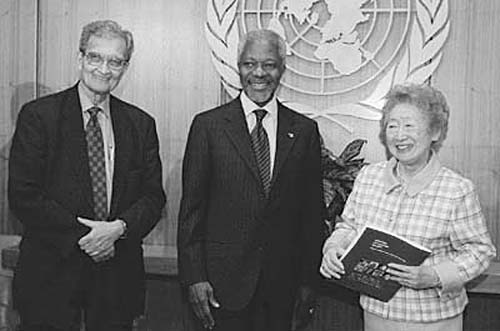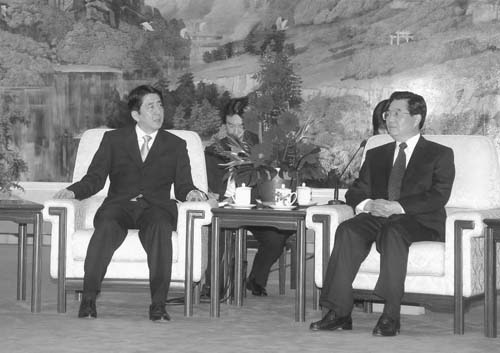Japan's Official Development Assistance White Paper 2006
Main Text > Part I JAPAN'S OFFICIAL DEVELOPMENT ASSISTANCE FOR WORLD PEACE AND PROSPERITY > Chapter 1 The Role of ODA: Its Transition and Changes > Section 3. The New Role Required of ODA
Section 3. The New Role Required of ODA
Since the latter half of the 1990s, a new set of issues has emerged to confront Japan and the international community. The first is a domestic one: the slump in the Japanese economy during the years now called "the lost decade" placed public finance into a severe state, and the size of the budget for ODA has shrunk. The amount allocated to ODA in the FY2006 general account budget was ¥759.7 billion, representing a 3.4% drop compared with the preceding fiscal year and a 35% reduction over the past nine years. Against the background of these situations, the need to pursue more strategic and efficient implementation of ODA and the need for prioritization have increased. The second new issue is the economic ascendancy of many emerging countries, which has intensified competition in international markets. As a result of this competition, the economic gap between developed and developing countries has grown more serious, and attention is now focused on the problem of poor developing countries such as those in Africa which have been left behind in economic development. The third issue is the growing seriousness and threat of global issues such as environmental challenges and infectious diseases. These are acute problems for the international community as a whole in this era of closer relationships of interdependence.

The handover of the final report on human security (Photo: Osamu Honda)
Against this backdrop, the concept of "human security" has been advocated, and its significance has gained wider recognition. Human security places individuals at its core and seeks to create a society that allows each person to lead a dignified life by protecting and empowering individuals and local communities exposed to, or currently under, threat. At the UN Millennium Summit in 2000, Japan clearly indicated that Japan would uphold "human security" as one pillar of Japan's foreign policy, and that Japan would strive to promote and realize the concept of human security in the international community. In addition, The Millennium Development Goals (MDGs) were formed as the common development challenges to be tackled by the international community based on the UN Millennium Declaration1 adopted at the UN Millennium Summit in 2000 and the international development goals adopted at major international conferences and summits held in the 1990s.2 Moreover, the terrorist attacks in the United States on September 11, 2001 raised awareness of the importance of fight against terrorism and of peacebuilding. Recognizing the poverty in developing countries as a breeding ground for terrorism, tackling poverty of developing countries became the highest priority of the international community.

Prime Minister Abe holding talks with President Hu Jintao of China (Photo: the Cabinet Public Relations Office)
Developing countries have limited capacity to tackle these diverse issues. Since the interdependency of countries in the world are remarkably increased, the problems of developing countries can easily spread and become a major threat, even for Japan. As one of the world's major countries, Japan is expected by the international community to help achieve the MDGs and tackle other global challenges through ODA.
Against this backdrop, the ODA Charter was revised in August 2003, taking into account the opinions of a wide range of Japanese people. The new ODA Charter sets forth the objective of ODA as, "to contribute to the peace and development of the international community, and thereby to help ensure Japan's own security and prosperity." In its basic policy, moreover, the Charter re-emphasizes that human security focused on individuals must be the approach taken to address the direct threats of conflict, natural disasters, and infectious diseases, and provides that Japan will take the perspective of "human security" and work to achieve this goal in implementing ODA. Furthermore, the Charter sets poverty reduction, sustainable growth, addressing global issues, and peacebuilding as the priority issues to be dealt with by ODA. It also clearly indicates that Japan will fulfill its responsibilities as a member of the international community under the determination that Japan, as one of the world's leading nations, will make best use of ODA to take the initiative in addressing these issues.
Assistance to developing countries is not only important as a contribution to the international community; it is also important in various ways to the security and prosperity of Japan itself. First of all, contributing to the economic growth of the recipient countries by transferring Japan's technology and know-how through ODA helps to ensure that Japan has influence in and is trusted by the international community. Secondly, contributing to the stability and development of developing countries through ODA is highly important to Japan—which enjoys the benefits of international trade and depends greatly on foreign countries for resources, energy, and food—because it ensures a stable supply of these goods and materials. Thirdly, global environmental problems and infectious diseases such as avian influenza and Severe Acute Respiratory Syndrome (SARS) are challenges common to the international community. Therefore, assisting developing countries to address these challenges through ODA, including active utilization of international organizations, with a view to achieving the MDGs is highly important to Japan.
Amid the new international milieu characterized by the rise to prominence of countries such as Brazil, Russia, India, and China,3 a new role is required of ODA. This is especially true with respect to Asia, where further economic growth of countries like China, India, and Thailand has developed and expanded, markets and deepened interdependence among countries are taking place. Under the circumstances, it is extremely important to promote private sector economic activities, including those by Japan, and economic partnerships through economic cooperation. Specifically, ODA must fulfill a new role: it must provide support for the development of industrial and distribution infrastructure based on market economies; support for the institution building for customs and the protection of intellectual property rights; support for the promotion of the Economic Partnership Agreements (EPAs); and support for human resource development to correct the disparities suffered by the least developed countries. Other major issues from the perspective of supporting Japan's economic prosperity include: strengthening relations with resource-rich countries and building a favorable environment for the development of resources through ODA in order to secure resources and energy; and active cooperation for energy conservation and development of alternative energy sources.
Chart I-1 Perspective of ODA Reform and Institutional Reform of MOFA

To enable this new role of ODA to be fulfilled, various discussions have been held in Japan concerning ODA reforms. As a result of these discussions, the Overseas Economic Cooperation Council was established in April 2006 to serve as headquarters that examine, in a timely and substantial manner, important matters concerning ODA to enable implementation of strategic overseas economic cooperation. In August, the International Cooperation Bureau was established in the Ministry of Foreign Affairs (MOFA) which plays a core role in coordinating ODA planning and formulation of ODA policies under the Council. The Ministry was recognized in order to enhance the planning and formulation function for implementing ODA, as well as to promote further linkages between bilateral assistance and multilateral assistance through international organizations. Moreover, in order to improve the effectiveness of assistance through enhanced coordination between such instruments as yen loans, technical assistance, and grant aid, the Japan International Cooperation Agency (JICA) and the yen loan departments of the Japan Bank for International Cooperation (JBIC) will be integrated in October 2008, and the new JICA will take charge of these instruments in an integrated manner (refer to Chapter 3 Section 1 for further details).
Thus, for Japan, which under the constitution has renounced war and does not possess major military forces, ODA is an indispensable policy instrument for contributing to the peace, stability, and prosperity of the world through peaceful means, and for building an international environment favorable to Japan itself. Furthermore, the realization of human security in the world is in Japan's interests. The importance of Japan's ODA in these respects will be explained, with specific examples, in the next chapter.


 Next Page
Next Page